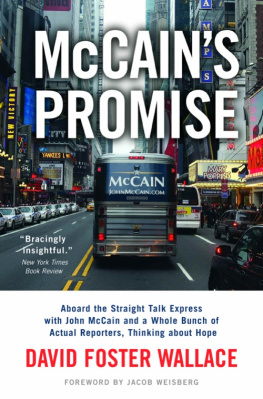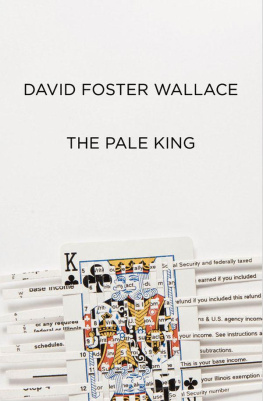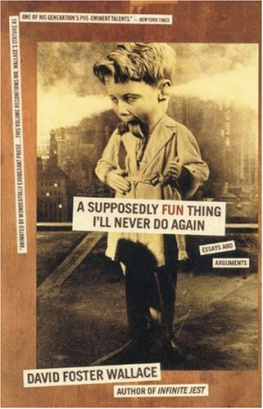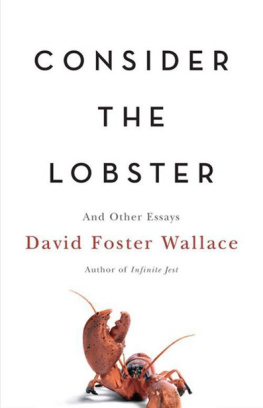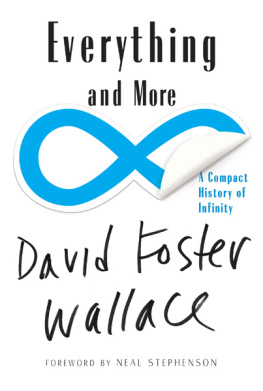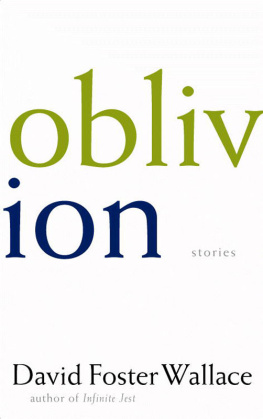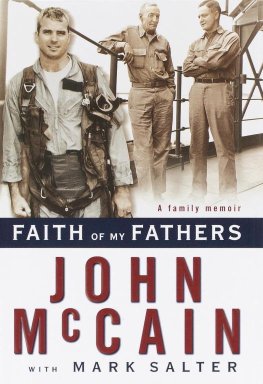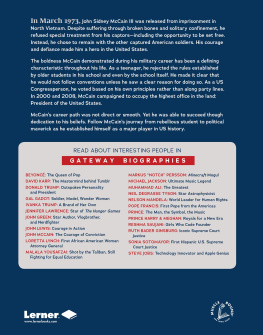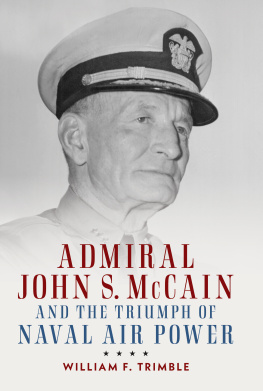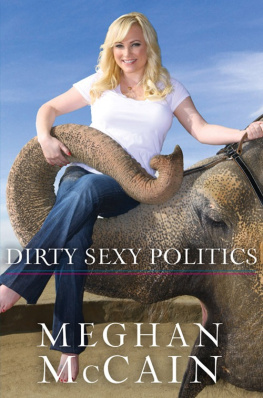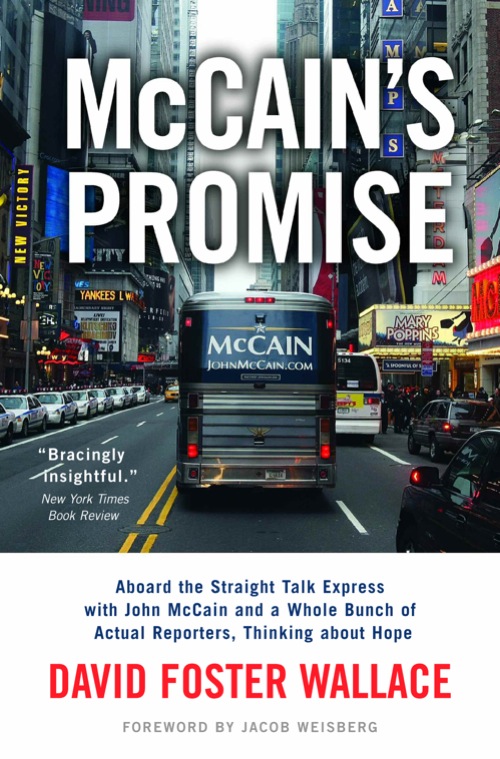Copyright 2006 by David Foster Wallace
Foreword copyright 2008 by Jacob Weisberg
All rights reserved. Except as permitted under the U.S. Copyright Act of 1976, no part of this publication may be reproduced, distributed, or transmitted in any form or by any means, or stored in a database or retrieval system, without the prior written permission of the publisher.
Back Bay Books / Little, Brown and Company
Hachette Book Group USA
237 Park Avenue, New York, NY 10017
Visit our Web site at www.HachetteBookGroupUSA.com
First eBook Edition: June 2008
McCains Promise was originally published in December 2005 under the title Up, Simba in David Foster Wallaces nonfiction collection Consider the Lobster, and was published in a heavily edited form in Rolling Stone in April 2000.
ISBN: 978-0-316-04094-5
ACCLAIM FOR DAVID FOSTER WALLACES
Wallaces longing for the apparently rare virtues of frankness and sincerity in public life makes him admire John McCain, despite the senators scary right-wing views.... Wallace manages to show just how political spin-doctoring has evolved since 1972, when Timothy Crouse (in The Boys on the Bus) and Hunter Thompson (in Fear and Loathing on the Campaign Trail) covered the clumsy attempts at it by the Nixon and McGovern campaign staffs. He is bracingly insightful, too, about the equally cynical process whereby representatives of major TV networks and the mainstream press select their news.... Much of McCains Promise really works out the tension between Wallace the postmodernist obsessed with packaging and marketing and strategy and media and spin, and Wallace the moralist seeking evidence of a rooted and authentic self. It is as though Wallace cannot stop expecting McCain to somehow transcend the deceptions and distortions of the spin doctors and the media and remain true to himself: to the McCain who refused to leave prison in Vietnam, and whose moral character has survived an even longer confinement inside the Beltway.
Pankaj Mishra, New York Times Book Review
Watching Wallace play his outrage meter is a little like watching John McEnroe complain about a line call. Its not always the accuracy of the claim that keeps you caring, but the hysterics with which its expressed.
John Freeman, Boston Globe
Dispatched by Rolling Stone to cover the doomed 2000 presidential campaign of Arizona Sen. John McCain, Wallace conveys a genuine disillusionment at the sham of the whole arrangement: the endless political posturing, the robotic news coverage. He figures out pretty quickly that the buzz around McCain emanates mostly from the campaign media, who celebrate his piss-and-vinegar candor while failing to note the sometimes extremely scary right-wing stuff this candor drives him to say.... Wallace is actually writing about something more fundamental here, a very modern and American type of ambivalence, a sort of interior war between your deep need to believe and your deep belief... that theres nothing left anywhere but sales and salesmen.
Steve Almond, Los Angeles Times Book Review
Compelling.... My own rsum happens to have NOT A POLITICAL JOURNALIST right there at the very top, writes Wallace, and its that lack of expertise and accompanying jadedness that lends the piece an element of genial curiositysort of like a very bright tour guide whos still learning the ropes.... More interesting than terminology is Wallaces patient and thoughtful meditation on what McCains military pastspecifically, his five-plus years as a prisoner of warmeans about his moral fiber.
Kevin Canfield, Atlanta Journal-Constitution
Wallaces inexperience as a campaign reporter is an advantage here, leading to unvarnished insights into media hierarchies and the use of negative advertising to depress turnout, an anti-democratic practice that benefits extremist candidates with fanatical supporters. In reality, Wallace scolds apathetic citizens, there is no such thing as not voting: you either vote by voting, or you vote by staying home and tacitly doubling the value of some Diehards vote.
Ariel Gonzalez, Miami Herald
ALSO BY DAVID FOSTER WALLACE
THE BROOM OF THE SYSTEM
GIRL WITH CURIOUS HAIR
INFINITE JEST
A SUPPOSEDLY FUN THING I LL NEVER DO AGAIN
BRIEF INTERVIEWS WITH HIDEOUS MEN
EVERYTHING AND MORE
OBLIVION
CONSIDER THE LOBSTER
In August 2007, John McCain came through New York to promote his latest book, HardCall: Great Decisions and the Extraordinary People Who Made Them. McCains editor, Jonathan Karp, was kind enough to offer me one of the hour-long slots set aside for back-to-back interviews in his office. The new book, written with (all right, by) McCains literary alter ego, Mark Salter, was evidently meant to serve as a kind of Profiles in Courage for the Arizona Republicans presidential campaign. It recounted moments in which wise leaders made brave choices: Lincolns issuing the Emancipation Proclamation, Branch Rickeys hiring Jackie Robinson to break baseballs color barrier, etc. I sampled a few of these vignettes just before our meeting and found them characteristically well done.
But the book, at that moment, seemed rather beside the point. While Salter was hard at work on Hard Call, McCains presidential campaign had fallen apart. Instead of breaking away from the Republican pack, McCain was loping after it from a considerable distance. At that point, McCain was trailing Rancorous Rudy, Mutable Mitt, and possibly even droopy-eyed Fred Thompson in the polls. McCain had raised a pitiful amount of money and quickly run through it. Hed just fired his longtime campaign manager and laid off three quarters of his feuding and divided staff. Esquire reported that he was personally scrutinizing the campaigns daily donut order as a cost center. Unlike his first book, Faith of My Fathers, the Salter-abetted autobiography that had launched his 2000 bid, Hard Call was looking like a tough sell.
I hadnt seen much of McCain since his famous insurgency in the Republican primaries that year, which I covered for Slate. Like most other reporters who spent time trailing his campaign, I retained fond memoriesof the candidates unprecedented candor, his gleeful mischief-making, and the sheer fun of hanging around with him. In the intervening years, however, the spirited maverick had seemed to turn into a weary dray. Preparing his presidential bid, he had mended fencesalbeit with evident insinceritywith Christian evangelicals, corporate lobbyists, and anti-tax ideologues who composed his partys power base. Worst of all, McCain was making nice to his 2000 nemesis George W. Bush. With a few exceptions, his idiosyncratic conservatism had turned ordinary.
Yet I held out hope that McCain might have not changed really, and that proximity to defeat might put him in the subversive frame of mind I remembered so fondly. So when we sat down, I prodded the Senator politely, but as obnoxiously as I could. I was just back from a book-writing leave myself, I told him, and hadnt been following the Republican primaries very closely (which was true). But from a distance, his campaign sure as hell looked like a train wreck.
Jacob, he answered with a sigh, you dont know the half of it. Where another politician would have been spinning madly to disabuse me of the erroneous assumption that he was somehow not on the verge of victory, McCain launched into his own epic kvetch about how screwed up his campaign was. He hadnt been able to raise the money that his aides said would pour in, hed been wildly overspending, hed been too inaccessible, and he wasnt connecting with voters. He sounded like he was criticizing his

